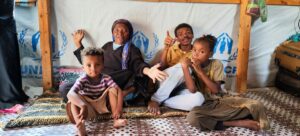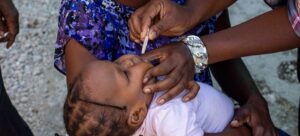Bringing together Governments, institutions, banks, businesses, non-governmental organizations (NGOs), youth, women, indigenous peoples and many other stakeholders from around the world, the UN 2023 Water Conference (22 to 24 March) will seek to find game-changing solutions to the multifaceted global crisis of ‘too much water’, such as storms and floods; ‘too little water’, such as droughts and groundwater scarcity; and ‘too dirty water’, such as polluted drinking water.
Ambassadors of the Conference co-hosts, Yoka Brandt, Permanent Representative of the Kingdom of the Netherlands to the UN, and Jonibek Ismoil Hikmat, Permanent Representative of the Republic of Tajikistan to the UN, spoke about the issues at stake and discussed how the world can unite for water action.
This interview has been edited for length and clarity.
UN News: Why is water an issue so important to your country and the rest of the world?
Yoka Brandt: For us, water is, has always been, and will always remain a priority issue. Our country, with its low-lying river delta on the North Sea and small islands in the Caribbean, was quite literally shaped by water. Over the past centuries, we have gained a lot of experience in dealing and living with water. And like others, we continuously face new challenges, such as droughts and floods, and the consequences of a rising sea-level both in Europe and the Caribbean.
Despite these challenges, water can be a convener and connector, and, if managed well, even a catalyst for equity, prosperity and sustainability. More than 900 years ago, our country recognized the capacity of water to be a platform to bring us together across divides, vested interests and across the borders and barriers we created. This was institutionalized through our water governance model and cooperation with regional water authorities. Water security has been firmly embedded in our laws, policies and budgets. And we continue to explore with others new avenues and approaches on how to prepare and revalue water for the benefit of all and for our planet.

Jonibek Hikmat: Water is close to our heart. Tajikistan is a mountainous country blessed with abundant water resources. For over two decades, it has been actively championing this noble cause through its water-related initiatives. To date, our Government has initiated eight water-related UN General Assembly resolutions. Our global initiatives on freshwater, international cooperation, water for life, and now water for sustainable development have been contributing immensely to advancing water-related goals. Indeed, partnership and cooperation are two great recipes for our success in this journey, which brought both the upstream and downstream countries as co-hosts to lead this important and ambitious Conference.
UN News: Is the world on track to achieve internationally agreed water-related goals by 2030?
Jonibek Hikmat: The progress on the Sustainable Development Goal (SDG) 6 and other Goals are lagging due to the impact of the COVID-19 pandemic, climate crises and conflicts. We must work up to four times faster to get on track to meet SDG 6 – to ensure availability and sustainable management of water and sanitation for all by 2030. The Water Conference is a good opportunity for all of us to review and assess the progress achieved and the gaps and constraints we faced in the implementation of these goals. It is also a good opportunity to strengthen cooperation and partnership to catalyze and accelerate water actions.

UN News: In your vision statement for the Conference, you described water as a “dealmaker” for a more sustainable and inclusive world. Can you explain the linkages between water and the achievement of the Sustainable Development Goals?
Yoka Brandt: Without water, there is no life. Water is fundamental to our daily lives and has direct linkages with health, climate, economic development and so on. Water scarcity undermines food and health security, and negatively impacts our energy supply and our climate goals. Too much water makes our communities face storms, rain and floods. And pollution and lack of access to safe drinking water, sanitation and hygiene facilities severely hamper opportunities, especially for women and girls, and puts lives at risk. Finding solutions for water can therefore make a substantial contribution towards achieving all the SDGs.
Water links all the grave challenges of our time, from food and energy security to health and climate change. Last year’s floods, in Pakistan and Nigeria, or the enormous droughts and bushfires in the Amazon rainforest and Australia are a sobering reminder of water’s power to turn lives upside down and threaten our health, our safety, our food, and our living environment. The COVID-19 pandemic has also reminded us that lack of access to safe water and hygiene and sanitation facilities is creating unprecedented risks and vulnerabilities, with women and girls not having the opportunity to equally participate in society.

UN News: What are the main expectations for the Conference?
Yoka Brandt: We need a Paris-moment for water. As UN Secretary-General António Guterres recently stated, we need to act decisively before it is too late. And we need to act with transformative commitments. This is what we aim to do at the Water Conference because we need more partnerships, more investments and more action. We need a Water Action Agenda filled with bold commitments to accelerate implementation of the Water Action Decade and the 2030 Agenda.
Jonibek Hikmat: A successful Conference must be inclusive both in terms of the process and the results, leaving no one behind, with strong participation from the global South and across stakeholder groups such as women, youth and indigenous groups. A successful Conference must also be cross-sectoral, mobilizing all other sectors to improve the way they manage and utilize water resources. A successful Conference must be action-oriented. On 24 March, we will present a Water Action Agenda, filled with transformative and game-changing commitments that can truly accelerate progress towards the water-related goals. We do not need a Conference with bold statements. We need a Conference with bold commitments, and the boldness to put these commitments into action. We need commitments from Governments, civil society and the private sector from all over the world.

UN News: What is needed to ensure a water-secure world for all?
Yoka Brandt: Business as usual is not sufficient to reach the SDGs for water, water related goals and global water security. In the run up to the Conference, Governments, the UN, civil society organizations, businesses, investors, local communities, youth and so many other stakeholders are joining hands to make a difference by initiating commitments for the Water Action Agenda. As a UN Member State, we are also stepping up our national and international efforts. For example, we initiated the Global Commission on the Economics of Water that will look at new policies, approaches and collaboration that go beyond traditional economic thinking to radically change how we understand, value and manage water as a common good. We will also invest in better data to improve our responses to water related disasters, we will increase access to water and sanitation to reach those left behind, and we will invest more in solutions to tackle climate change, hunger and biodiversity loss.
Jonibek Hikmat: We initiated both international Decades ‘Water for Life’, 2002-2015 and ‘Water for Sustainable Development’, 2018-2028. We also launched the Dushanbe Water Process – biennial international conferences on water. The second such conference held in our country in June 2022 adopted the Dushanbe Declaration, which includes important messages to unite global efforts, make new commitments, and intensify and accelerate actions and partnerships to achieve the goals of the Water Action Decade.

UN News: What is the role of youth in addressing water-related challenges?
Yoka Brandt: The Water Conference provides a unique opportunity to unite the world for water. We aim to bring everyone together, and have all different voices heard. Youth play a very important part in this. Their voices, ideas and solutions are crucial for solving today’s water-related challenges. The co-hosts are fully committed to include youth in the entire process: from preparation to follow-up.
UN News: With the UN’s SDG Summit in sight for September 2023 and the Summit of the Future in 2024, what are the next steps to advance the global water agenda after the Water Conference?
Jonibek Hikmat: The Water Action Agenda is a means to an end, not an end in itself. We want to use existing structures as much as possible, both in terms of implementation and monitoring and reporting. Therefore, follow-up of these commitments should be embedded into existing structures, such as the SDG Summit in September and the Summit of the Future in 2024.
















